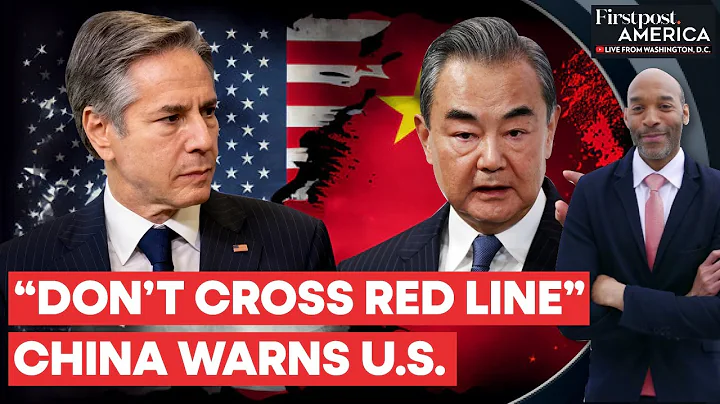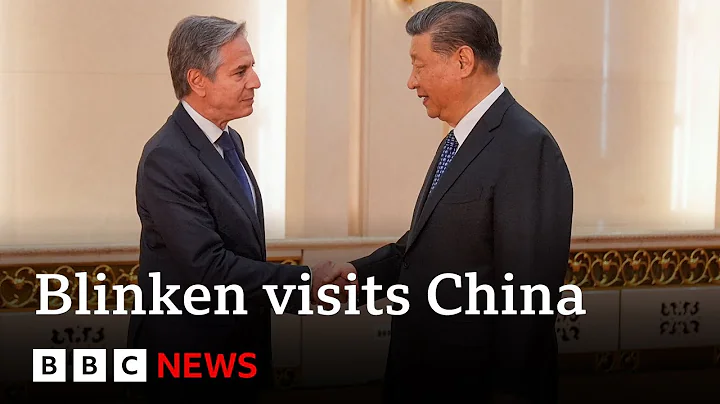China News Service Beijing, June 24th: The United States should take the first step in easing its strategic easing towards China
China News Service reporter Peng Dawei
It has been a year and a half since the Biden administration took office, but Sino-US relations have not yet "touched the ground" Bottom rebound." In his recent speech on China policy, US Secretary of State Blinken even talked about "investment, coordination, and competition". Who is seriously undermining the international order? How should the U.S. policy toward China find a new path?
Recently in China News Service's "East-West Question·China-Foreign Dialogue", Professor Chen Dingding of Jinan University and Director of the Haiguo Tuzhi Research Institute, and Dr. Hu Yishan, Chief Advisor of the Malaysian Pacific Center and Senior Researcher of the Singapore Institute of International Affairs, as well as the American "China Joseph Gregory Mahoney, deputy editor-in-chief of the Journal of Political Science and professor at the School of Politics and International Relations at East China Normal University, started a dialogue on this.

In response to Blinken's claim that China "poses the most severe long-term challenge to the international order," Hu Yishan pointed out that the United States is in a dilemma internationally. It has "withdrawed from the group" but does not want to abstain. It still wants to play a role in the international order and structure. A certain role. He pointed out that under this circumstance, the United States' claim to "maintain the existing international order" is unconvincing.
Mahoney believes that compared with the continuity and stability of China's policy, U.S. foreign policy will become more and more unstable as time goes by. He believes that this trend has been very obvious during the Trump administration and continues to this day. He pointed out that the rift between Europe and the United States has not disappeared because of the Ukraine crisis. In addition, the United States is not prepared for the chaos that may result from the latest strain of the new coronavirus epidemic, and it is becoming increasingly unstable as a country.
Excerpts from the dialogue are as follows:
Chen Dingding: In his recent speech on China policy, US Secretary of State Blinken claimed that "China poses the most serious long-term challenge to the international order." However, international people generally believe that China has actively maintained the multilateral system represented by the United Nations and the WTO, and has made increasing contributions to global governance issues. On the other hand, the United States' continuous "withdrawal" from the group, the adoption of unilateral sanctions, and the overriding of domestic law over international law may be the real damage to the international order. What do you think?
Hu Yishan: Now the United States may be in a dilemma internationally. On the one hand, it is undeniable that the overall international order after World War II was mainly formulated and led by the United States. However, when it comes to international affairs, sometimes the White House, the House of Representatives and the Senate may have different opinions, leading the United States to "withdraw" from some international organizations or international structures it created in the past few decades.
"Withdrawing" means that you are "abstaining", but the problem is that the United States has "withdrawed" but does not want to abstain. It still wants to play a certain role in these international orders and international structures.
At the same time, China is becoming more and more actively participating in these organizations and international orders that were established under the leadership of the United States. Of course, the United States feels very uncomfortable. While China plays an active role, the United States, as an original member, is in a state of "semi-withdrawal" and engages in isolationism, which runs counter to the overall trend of the WTO. Therefore, under such circumstances, the persuasiveness of (the United States) in "maintaining the existing international order" may not be so strong.
Mahoney: Previously, even before Trump took office, the United States would only selectively participate in and fulfill its commitments to multilateral organizations, claiming that these organizations were "too corrupt" or "ineffective."
So when the United States talks about reinvigorating the rules-based order, I'm not quite sure what they're talking about. Indeed, Biden has re-engaged with multilateral organizations after Trump frequently "withdrew" from the group. But I think he has no interest in pushing these organizations to reform in a direction that is fairer to China. In addition, he is taking unilateral actions and establishing cliques. In the future, I think we will see more examples of this.
Chen Dingding: Can the newly established "China Group" of the US State Department effectively deal with the so-called "competition and challenges" from China?
Mahoney: To some extent, these groups are just showing up to create the impression of working hard. Remember, they've put together a lot of different teams to deal with China. But what I think is most concerning is that it will allegedly interact with similar units from the CIA and the Department of Defense. I think this is interesting because historically these three organizations have had very different institutional cultures. At least until the Trump administration, they had very different stances on China. I think that, to some extent, this competition in positions helps to balance China policy. But my concern now is that the entire U.S. government is being influenced by this groupthink on China, and they may actually be competing against each other to see who is the most radical.
Chen Dingding: What do you think of the recent series of actions by the United States on the issue of "support for Taiwan"?
Mahoney: I don’t think Washington really cares about Xinjiang, Tibet, Hong Kong or Taiwan. They only care about maintaining the hegemony of the dollar. What they care about is how (the United States) can somehow keep the economic system going after so many years of mismanagement. In fact, politically, many domestic problems in the United States have become difficult to solve. So they have a very strong desire to maintain some degree of the status quo. Honestly, I think they're willing to sacrifice anyone necessary to maintain this critical goal.
Chen Dingding: Historian Niall Ferguson believes that US-China relations have reached a moment of restarting the strategic relaxation of the 1970s. What do you think of this appeal?
Hu Yishan: The United States is currently facing great social and economic challenges, with a high inflation rate, and economic development may not be as ideal as before. So one of the solutions is of course to gradually reduce the high tariffs imposed on China and other countries during the Trump administration so that free trade can be smoother. Then (in this way) the biggest beneficiary is the United States.
If there is to be a strategic relaxation and resolution of differences, the best way is indeed to start with lowering tariffs. Judging from the experience of our Southeast Asian countries over the years, when trade increases, the possibility of conflict between the two countries will be greatly reduced.
So I think that if there is to be strategic relaxation, the United States must take this step first and slowly reduce those tariffs that should not have been imposed in the first place - preferably repeal them.
Chen Dingding: What kind of development will China usher in after the 20th National Congress? How will China's global influence develop?
Mahoney: China has continuity and stability and does not pursue the same foreign policy as the United States. I think the United States will become more and more unstable as time goes on. This trend was already evident during the Trump administration and continues today. But the rifts that exist between Europe (and the United States) have not disappeared because of the Ukraine crisis. Overall, the position of the United States and its closest allies is being seriously eroded.
I don’t think the world really perceives the threat of the Omicron BA.4 and BA.5 mutant strains and their immune evasion capabilities. The United States itself is not fully prepared for this. In fact, I'm talking to friends in the United States who have been infected with COVID-19 three times. In my hometown, a friend who works for a Japanese company (local in the United States) told me that 25% of their employees have lost their jobs due to COVID-19.
Hu Yishan: Everyone hopes that China will continue to play a leading role in revitalizing the global economy. Just now we also discussed that the United States seems to be overwhelmed in terms of economy, trade, commerce and other aspects. It is already very good that it can continue to operate its own economy. However, various parts of the world, especially our developing countries, may still need foreign investment.
Under such circumstances, we have seen that China has recently emphasized once again that initiatives such as the "One Belt, One Road" will continue, so we hope that after the 20th National Congress, China's original large-scale initiatives can be intensified.If there are new initiatives that can revitalize the global economy, we will also welcome them. (End)
















![[Trailer] Imperfect Us (不够善良的我们) | Coming to Viu - DayDayNews](https://i.ytimg.com/vi/KQrxvuufYBE/hq720.jpg?sqp=-oaymwE2CNAFEJQDSFXyq4qpAygIARUAAIhCGAFwAcABBvABAfgB_gmAAtAFigIMCAAQARg-IGEoZTAP&rs=AOn4CLApSSM8_qWTqVoXfkOzeQClA5gjkg)





